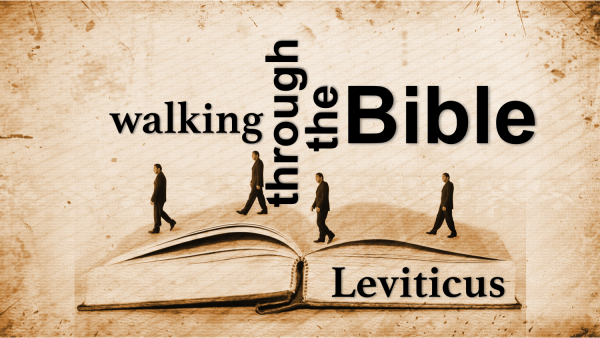Leviticus derives its name from the Septuagint, the Greek translation of the Old Testament, which named it thus because of its connection with the services of sacrifice and worship administered by the Levitical priesthood. However, its Hebrew title came from the first few words of the text, “And the Lord called.” This giving evidence to its relationship in continuation of the book of Exodus, the second inspired book of Moses. The account focuses on Jehovah’s commands regarding worship and Israel’s everyday activities regarding morality, secular and social expectations, feast days, and even hygiene. And not surprisingly, the laws given by God unto the people regarding sanitation and also food preparation have stood the test of time, being standards for such even today.
As with the first two of the five book penned by Moses, this record dates back to the closing years of the wilderness wanderings of Israel in and around the Sinai peninsula sometime shortly before 1400 B.C. Mosaic authorship is without question in the minds of true Bible scholars, and is only questioned by the highly educated (i.e., clinically insane) who hold to a more scientific form of penmanship which altogether in its very theory questions and blatantly rejects the verbal inspiration of the Bible (II Timothy 3:16). However, as mentioned above its obvious continuation from Exodus, which was an obvious continuation of Genesis, gives adequate proof, among further, that Moses is without doubt or reservation the inspired writer of this text.
The account of Leviticus begins wherein Exodus concluded at the completion of the tabernacle which had been preceded in the giving of the law by the appointment of the Levitical priesthood and means in which they were to dress and conduct themselves. With this background, Moses then continues these inspired instructions telling the people how then the tabernacle and the priesthood is to be used including animal sacrifices and feast days, among which was the annual Day of Atonement, the day in which the sins of the people were ceremonially expelled from the camp of the nation until the next year. Moses wrote “to show Israel how to live as a priestly kingdom and a holy nation in fellowship with God” (Wilkinson and Boa). It is this connection to the history thus far recorded that helps the student realize the true purpose of Leviticus. In Genesis sin entered the world along with the hope of the coming Messiah, and it was based on this hope that a promise was made to Abraham that all families of the earth would be blessed through his seed. Genesis then closes and Exodus opens with that seed in Egyptian bondage under the rule of a ruthless Pharaoh and subject to toilsome taskmasters. But the nation was redeemed from bondage through Jehovah’s mighty hand of protection and the people were led out of Egypt and toward the land of promise where they would live and function together in anticipation of the Messiah to come, bringing full and everlasting redemption. Now it is on the verge of potentially entering that bountiful and fruitful land, that God provides the means through which they would live and function, a holy law with the purpose of giving them religious, social, and moral structure with the purpose of preserving the seed line through which the Lion of the tribe of Judah would come, the Messiah.
Leviticus’ theme is typically recognized to be “holiness.” It was written so that an unholy nation might come to know and approach a holy God through the means of sacrifice and priestly mediation. God can only be approached in an holy manner and the source of holiness can only be God, therefore God had to provide the means by which the people could know holiness and in the process know God as much as was permitted, the result of which is Leviticus.
As with every other book in the Bible, Christ is pictured in Leviticus. This time He is seen in the institution of the office of the high priest (Hebrews 4:14-16). The high priest had to be free from infirmities and defects (Leviticus 21:10-23) and Christ was holy and without defect (Hebrews 7:26). The high priest made annual atonement for the people (Leviticus 16:3-16) and Christ made one atonement for all mankind (Hebrews 9:7-14). The high priest had charge over the tabernacle (Hebrews 9:6-7) and Christ is over His tabernacle today, the church (Hebrews 10:21). The high priest had authority in making judgments and decisions (John 18:13) and Christ has all authority today (Matthew 28:18). But the most important connection between the high priest and Christ is that the high priest served for life and was succeeded by a son (Hebrews 7:23) and Christ reigns as High Priest for life also, but shall have no successor for He ever lives (Hebrews 7:24,28).
The book of Leviticus is so rich and vitally important to the Christian’s understanding today that it cannot afford to be left in the annals of history. Let it continue to be studied today with earnestness that its valuable lessons and principles shall continue to unlock the fullness of inspired Writ.

